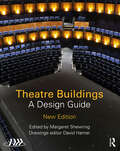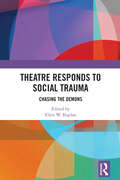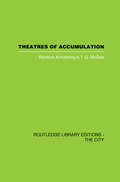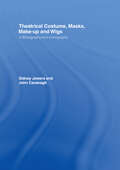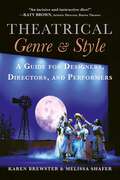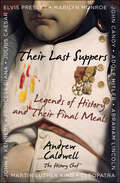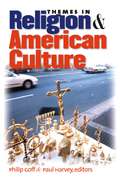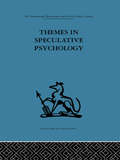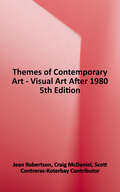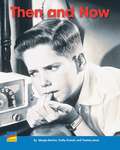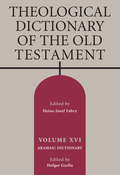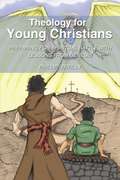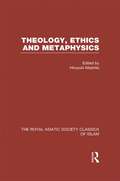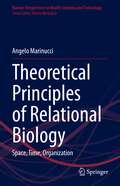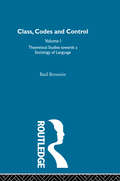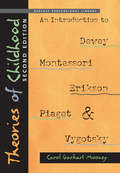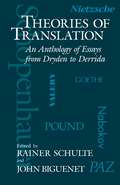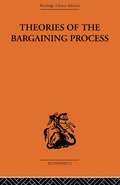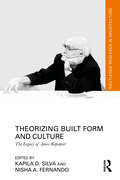- Table View
- List View
Theatre Buildings: A Design Guide
by Margaret Shewring David HamerIn 2021, its Diamond Jubilee year, the Association of British Theatre Technicians (ABTT) undertook to revise Theatre Buildings: A Design Guide (Routledge, 2010). This new edition (Routledge, 2023) has substantially re-written text with fresh images and entirely new reference projects, providing essential guidance for all those engaged in the design of theatre buildings. Edited by Margaret Shewring (Emeritus Reader, University of Warwick, former Director of the Postgraduate Diploma and MA in Theatre Consultancy), this new publication is written by a team of international experts, architects, theatre consultants, acousticians, engineers and industry professionals led by Tim Foster (Foster Wilson Size) and Robin Townley (CEO of the ABTT). It provides an invaluable resource for those looking to build, remodel or conserve theatre buildings, taking into account the significant changes which have taken place in the last twelve years in all aspects of theatre design and technical practice. It locates those changes in the wider context of the need for sustainability in the theatre industry in response to the climate emergency, inclusivity, diversity of access, placemaking and concerns for health and wellbeing. This new edition provides guidance for anyone who seeks inspiration and encouragement to create or improve a place of entertainment or who seeks to understand what might be required to accommodate an audience for the presentation of live performance and the successful use, operation and organisation of such a venue. Its generous format and the thirty-two new reference projects, more than 260 high-resolution colour images and 175 diagrams and specially commissioned plans make it accessible and informative both to the general reader and the professional specialist.
Theatre Responds to Social Trauma: Chasing the Demons (Routledge Series in Equity, Diversity, and Inclusion in Theatre and Performance)
by Ellen W. KaplanThis book is a collection of chapters by playwrights, directors, devisers, scholars, and educators whose praxis involves representing, theorizing, and performing social trauma.Chapters explore how psychic catastrophes and ruptures are often embedded in social systems of oppression and forged in zones of conflict within and across national borders. Through multiple lenses and diverse approaches, the authors examine the connections between collective trauma, social identity, and personal struggle. We look at the generational transmission of trauma, socially induced pathologies, and societal re-inscriptions of trauma, from mass incarceration to war-induced psychoses, from gendered violence through racist practices. Collective trauma may shape, protect, and preserve group identity, promoting a sense of cohesion and meaning, even as it shakes individuals through pain. Engaging with communities under significant stress through artistic practice offers a path towards reconstructing the meaning(s) of social trauma, making sense of the past, understanding the present, and re-visioning the future.The chapters combine theoretical and practical work, exploring the conceptual foundations and the artists’ processes as they interrogate the intersections of personal grief and communal mourning, through drama, poetry, and embodied performance.
Theatres of Accumulation: Studies in Asian and Latin American Urbanization
by Warwick Armstrong T.G. McGeeIn the great cities of Latin America and Asia, international business and local firms meet and, in particular, influence teh development strategies of Third World countries. The authors of Theatres of Accumulation argue that these cities play a crucial role in the process of capital accumulation and of unequal exchange and dependency. They examine the twin patterns of convergence and divergence in lifestyles and economic activities, and show how the flow of capital through the urban system beings net losses to the rural regions and further exacerbates income inequalities between regions and classes. Theatres of accumulation provides an overview of urbanization in the Third World, as well as specific case studies. It deals with theoretical issues and projects the likely developments in urbanization in the future. Armstrong and McGee's work is essential reading for social science and planning professionals and students, in the developed world and the Third World, who are concerned with urban processes. This book was first published in 1985.
Theatrical Costume, Masks, Make-Up and Wigs: A Bibliography and Iconography (Motley Bibliographies Ser. #Vol. 4)
by Sidney Jackson JowersThis is the first bibliography in its field, based on first-hand collations of the actual articles. International in scope, it includes publications found in public theatre libraries and archives of Barcelona, Berlin, Brussels, Budapest, Florence, London, Milan, New York and Paris amongst others. Over 3500 detailed entries on separately published sources such as books, sales and exhibition catalogues and pamphlets provide an indispensible guide for theatre students, practitioners and historians. Indices cover designers, productions, actors and performers. The iconography provides an indexed record of over 6000 printed plates of performers in role, illustrating performance costume from the 18th to 20th century.
Theatrical Genre & Style: A Guide for Designers, Directors, and Performers
by Melissa Shafer Karen BrewsterA one-of-a-kind guide about style and genre for theatre artisans.Theatrical Genre & Style will appeal to all theatre makers—those in performance as well as design—students, amateurs, and professionals. Traditionally, theatre practitioners receive information about style and genre from sources composed primarily for studio artisans and not theatre artisans. These books are helpful but ultimately fall short because they do not specifically apply the use of style to theatre art and practice. Theatrical Genre & Style gives theatre artists a guidebook to style and genre that is specific and tailored to their needs. Theatrical Genre & Style defines genre and style (and the differences between them), gives relatable examples with helpful exercises, clearly explains the distinctions between artistic style, period style, and literary style, and helps readers understand how to identify, research, and utilize appropriate artistic styles for theatrical productions. Theatrical genres are listed, thoroughly explained, and examples and exercises given that are designed to elucidate. The ways theatrical scenery, costumes, lighting, sound, multi-media, acting, directing, and movement can work together to successfully utilize style is addressed in this text.Theatrical Genre & Style serves as a companion to authors Karen Brewster and Melissa Shafer's Fundamentals of Theatrical Design: A Guide to the Basics of Scenic, Costume, and Lighting Design. The two books complement one another in content, size, scope, purpose, and target audience.
Their Last Suppers: Legends of History and Their Final Meals
by Caldwell AndrewA journey through over 2000 years of culinary history and the final repasts of famous figures—with recipes included.Part historical narrative and part grilling guide and cookbook, Andrew Caldwell’s Their Last Suppers guides history buffs and gourmands alike through gastronomically inspired biographical accounts of more than twenty legendary personalities. Recipes are included (though the author has decided to skip the pork blood beverages drunk by the Spartans).Unearthing recipes as far back as 323 B.C., Caldwell, aka the History Chef, provides insight into two thousand years of culinary lore. Each historical figure’s profile includes a brief description of pursuits and accomplishments as well as little-known anecdotes, popular foods of his or her time period, recipes for the figure’s actual last meal, and cooking tips. Because the kitchens of Montezuma, Caesar, and other notables profiled within the book were often very basic, Caldwell brings their fare into modern kitchens, although he strongly believes that, whenever possible, grills and open fires should be used for most dishes and therefore provides specific preparation tips throughout.From the Titanic’s twelve-course tasting menu to personal recipes for Princess Diana’s Favorite Watercress Soup, Elvis Presley’s Fried Peanut Butter and Banana Sandwich, Julius Caesar’s Ambrosia, Cleopatra’s Hummus, and Stone Crab a la Kennedy, historians and foodies alike will relish the trivia and tastings paired within this unique and entertaining book.
Themes and Variations in Shakespeare's Sonnets
by J B LeishmanFirst published in 1961. This study analyses Shakespeare's treatment of the universal themes of Beauty, Love and Time. He compares Shakespeare with other great poets and sonnet writers - Pindar, Horace and Ovid, with Petrarch, Tasso and Ronsart, with Shakespeare's own English predecessors and contemporaries, notably Spenser, Daniel and Drayton and with John Donne. By discussing their resemblances and differences, a not altogether orthodox picture of Shakespeare's attitude to life is presented, which suggests that he was not as phlegmatic and equable a person as critics have often supposed.
Themes in Religion and American Culture
by Philip Goff Paul HarveyDesigned to serve as an introduction to American religion, this volume is distinctive in its approach: instead of following a traditional narrative, the book is arranged thematically. Eleven chapters by top scholars present, in carefully organized and accessible fashion, topics and perspectives fundamental to the understanding of religion in America. Some of the chapters treat aspects of faith typical to most religious groups, such as theology, proselytization, supernaturalism, and cosmology. Others deal with race, ethnicity, gender, the state, economy, science, diversity, and regionalism--facets of American culture that often interact with religion. Each topical essay is structured chronologically, divided into sections on pre-colonial, colonial, revolutionary and early republican, antebellum, postbellum and late nineteenth-century, early twentieth-century, and modern America. One can study the extended history of a certain theme, or read "across" the book for a study of all the themes during a specific period in history. This book's new approach offers a rich analysis of the genuine complexity of American religious life. With a helpful glossary of basic religious terms, movements, people, and groups, this book will become an essential tool for students and teachers of religion.Contributors:Yvonne Chireau, Swarthmore CollegeAmy DeRogatis, Michigan State UniversityWilliam Durbin, Washington Theological UnionTracy Fessenden, Arizona State UniversityJames German, State University of New York, PotsdamPhilip Goff, Indiana University-Purdue University at IndianapolisPaul Harvey, University of Colorado, Colorado SpringsSue Marasco, Vanderbilt University Winnifred Fallers Sullivan, University of Chicago Divinity SchoolRoberto Trevino, University of Texas, ArlingtonDavid Weaver-Zercher, Messiah CollegeDesigned specifically to serve as a core text for an introduction to American religion, this volume is distinctive in its approach: instead of following a traditional narrative, the book is arranged thematically. -->
Themes in Speculative Psychology
by Nehemiah JordanTavistock Press was established as a co-operative venture between the Tavistock Institute and Routledge & Kegan Paul (RKP) in the 1950s to produce a series of major contributions across the social sciences. This volume is part of a 2001 reissue of a selection of those important works which have since gone out of print, or are difficult to locate. Published by Routledge, 112 volumes in total are being brought together under the name The International Behavioural and Social Sciences Library: Classics from the Tavistock Press. Reproduced here in facsimile, this volume was originally published in 1968 and is available individually. The collection is also available in a number of themed mini-sets of between 5 and 13 volumes, or as a complete collection.
Themes of Contemporary Art: Visual Art After 1980, 5th Edition
by Jean Robertson Craig McDanielThis book offers students and readers an introduction to recent art. The primary focus is an examination of themes that are widespread in contemporary artistic practice. Individual chapters analyze thematic content in eight groupings: Identity, The Body, Time, Memory, Place, Language, Science, and Spirituality. These eight thematic categories provide a significant sample from which readers can grasp influential concepts that stretch across much of the art of our time. Profiles of key artists and works enhance students' understanding of these major themes and the individual approaches and key movements in the world of contemporary art.
Then & Now Bible Maps
by Rose PublishingWhat countries today occupy the Bible lands of 2,000+ years ago? Are the borders of Persia in Bible times the same as the borders of Iran today? The answers to these questions and many others are found in the Then - Now Bible Maps eBook. This fascinating reference tool contains seventeen Bible maps showing the locations of ancient cities and countries in comparison with modern-day cities and boundaries. What a great way to compare places in today's news with places in the Bible.Then - Now Bible Maps makes it easy to see where Persia is today and the places Paul's first missionary journey would take him if traveling the same route today. Below are just a few of the maps included in this incredible resource: The Middle East map during Bible times and todayThe Assyrian Empire, Babylonian Kingdoms and Persian Empire The Holy Land: 1020 BC and 900 BC - NowPlaces of Jesus' Ministry Then (26-30 AD) - Now Then - Now Bible Maps eBook makes it easy to compare locations that are familiar in the Bible with modern day locations. On each of the seventeen maps, Bible places are shown in black type and modern-day cities and countries appear in red type. The maps also provide helpful historic information. For example: The Holy Land: Then - Now shows the historical and modern-day names of cities within the regions occupied by the Twelve Tribes and how the Twelve Tribes divide up the land.Paul's Journeys: Then - Now shows the Seven Churches of Asia found in Revelation 1-3 (now in present day Turkey), cities and towns, ancient ruins, mountains, modern capital cities and a key for measuring the distance traveled from city to cityEmpires - Kingdoms: Then - Now shows the changing boundaries of the Assyrian Empire, Babylonian Kingdom, and Persian Empire Then - Now Bible Maps is a fascinating resource that you will refer to again and again when you are studying the Bible.
Then and Now
by Tammy Jones Margie Burton Cathy FrenchThis book is about the similarities between generations of people.
Theological Dictionary of the Old Testament, Volume XVI (Theological Dictionary Of The Old Testament Ser. #11)
by G. Johannes Botterweck; Helmer Ringgren; Heinz-Josef FabryVolume XVI concludes the monumental, critically acclaimed Theological Dictionary of the Old Testament with an Aramaic dictionary.This latest and last TDOT volume incorporates nearly the complete lexicon of Biblical Aramaic as well as a major portion of the theologically, culturally, and historically relevant terms in other ancient Aramaic writings. Each article provides information on the term&’s meaning and usage, is fully annotated, and contains a bibliography with cross-references to the entire TDOT series.Further enhancing this volume are an introductory overview of the history of Aramaic and a comparative grammatical outline of ancient Aramaic at the end of the book.
Theological Dictionary of the Old Testament, Volume XVI (Theological Dictionary Of The Old Testament Ser. #14)
by G. Johannes Botterweck; Helmer Ringgren; Heinz-Josef FabryVolume XVI concludes the monumental, critically acclaimed Theological Dictionary of the Old Testament with an Aramaic dictionary.This latest and last TDOT volume incorporates nearly the complete lexicon of Biblical Aramaic as well as a major portion of the theologically, culturally, and historically relevant terms in other ancient Aramaic writings. Each article provides information on the term&’s meaning and usage, is fully annotated, and contains a bibliography with cross-references to the entire TDOT series.Further enhancing this volume are an introductory overview of the history of Aramaic and a comparative grammatical outline of ancient Aramaic at the end of the book.
Theological Dictionary of the Old Testament, Volume XVII: Index Volume (Theological Dictionary of the Old Testament)
by Ronald E. PitkinThis useful resource, which concludes the illustrious Theological Dictionary of the Old Testament, provides TDOT users with an index to all sixteen previous volumes. The first part of this volume indexes keywords in Hebrew, Aramaic, and English, while the second part indexes all textual references—both biblical and extrabiblical.
Theology for Young Christians: Preparing for Spiritual Battle with Lessons from Genesis
by Phillip O'ReillyThe Center for Disease Control recently reported that suicide rates have increased by nearly 30% since the turn of the 21st century. Doubtless numerous factors contribute to this rise, but Stephen Meyer, the author of Darwin’s Doubt, identified one during an interview: the hopelessness of naturalism creates “existential anxiety.” If the universe truly sprang forth from impersonal forces and life from random mutations, life is devoid of meaning. This is the world our children occupy. Educators and policy makers fret over kids’ poor “self-esteem,” yet they peddle philosophies which rob them of all hope.The Bible remedies hopelessness. It offers a window for gazing at the Creator of the universe who gives life meaning. Moreover, it offers a mirror through which young people gain an accurate self-image. As a father of ten kids, I occupy a front-row seat to many attacks of Satan. Without exception, our children’s defenses against those attacks failed when they trusted their own wits or worldly wisdom and succeeded when they embraced the timeless truths of Scripture.Theology for Young Christians provides a framework for gaining a solid foundation in Scriptural truths. The book guides readers through Bible passages using tried-and-tested techniques for interpretation and application. Students are asked questions, shepherded through the process of finding answers and challenged to consider how Scriptural principles should impact behavior and thinking. At the end of this process, young people are better equipped to systematically study the Scriptures. Indeed, they will, we pray, be less dependent upon study guides and prepared to study other passages. Then, godly self-confidence replaces any manmade self-image, steels the young person for life’s battles and instills hope for victory.
Theology, Ethics and Metaphysics: Royal Asiatic Society Classics of Islam (Royal Asiatic Society Books)
by C. Edmund Bosworth Hiroyuki MashitaThis collection of classic works, originally published under the auspices of the Royal Asiatic Society, includes an introduction by Professor Edmund Bosworth, and a preface by Professor Anthony Stockwell. Primary texts include works by F. Rosen, W.F. Thompson, C.E. Sachau, R.A. Nicholson, W.H.T. Gairdner, W.M. Miller and J. Robson, spanning over 100 years of oriental scholarship.
Theoretical Principles of Relational Biology: Space, Time, Organization (Human Perspectives in Health Sciences and Technology #6)
by Angelo MarinucciThis book proposes the foundation of the relational approach to biology, rejecting the deterministic and reductionist approach of molecular biology. Although biology has made enormous progress in the last seventy years, onto genesis is still conceived as a “revelation” of information (DNA). Recovering the geometric tradition, relational biology conceives scientific and epistemological tools (cause, probability, space etc.) of science in a new way. If probabilistic biology and organicism still proposes a biology based on physics, with a fundamental invariant, relational biology is based on variation: its fundamental invariant is variation, one of the most important elements of life. This is an indispensable book for academics who consider biology from a new theoretical approach, in particular for those working in the domains of cancer, ontogenesis and evolution.
Theoretical Studies Towards a Sociology of Language
by Basil BernsteinThe papers in this volume show the origin and development of Bernstein's theoretical studies into the relationships between social class, patterns of language use and the primary socialization of the child.'Bernstein's hypothesis will require [teachers] to look afresh not only at their pupils' language but at how they teach and how their pupils learn.'Douglas Barnes, Times Educational Supplement'His honesty is such that it illuminates several aspects of what it is to be a genius.'Josephine Klein, British Journal of Educational Studies
Theorie und Praxis soziosensitiver und sozioaktiver Systeme
by Friederike Eyssel Bruno Gransche Jacqueline Bellon Sebastian Nähr-Wagener Ricarda WullenkordInteraktive technische Systeme sind zunehmend Teil unseres Alltags. Wie aber kann gelingende Mensch-Technik-Interaktion gestaltet werden? Welche Rolle spielen Aspekte sozial angemessenen Umgangs? Für das menschliche Zusammenleben haben sich in jeder Gesellschaft Kulturtechniken des Verhaltens und des Umgangs entwickelt. Wer sie beherrscht, weiß, wann bestimmte soziale Praktiken wie etwa Entschuldigungen angebracht sind und wie sie vollzogen werden. Können und sollten auch Assistenzsysteme mit derartigen Fähigkeiten ausgestattet werden? Das in diesem Buch vorgestellte, interdisziplinär orientierte Rahmenmodell der „FAktoren der Sozialen Angemessenheit“ (FASA-Modell) bietet eine strukturierte Annäherung an die Thematik und liefert eine Grundlage für eine hinsichtlich sozialer Angemesseneheit reflektierte Gestaltung soziosensitiver und soziaktiver Assistenzsysteme.
Theories of Attachment
by Carol Garhart MooneyIn this book, early childcare professionals will gain an understanding of the theories of attachment as well as the background and research of the prominent minds behind them. This book explains the core elements of each theorist's work and the ways these elements impact and support interactions with babies, including the topics of bonding, feeding practices, separation anxiety, and stranger anxiety.Carol Garhart Mooney, also the author of the best-selling Theories of Childhood, has worked as a preschool teacher and college instructor of early childhood education for over thirty years.
Theories of Childhood, Second Edition
by Carol Garhart MooneyExamine the work of five groundbreaking education theorists-John Dewey, Maria Montessori, Erik Erikson, Jean Piaget, and Lev Vygotsky-in relation to early childhood. Theories of Childhood provides a basic introduction to each theorist and explains the relationship of theory to practice and its impact on real children, teachers, and classrooms. This edition reflects current academic learning standards and includes new understandings of Vygotsky's work. It is a popular guide to help early childhood professionals be aware of the theories behind good child care practices. It is also a widely-used text in undergraduate programs, community college courses, and training workshops that focus on early development and education.Carol Garhart Mooney has been an early childhood educator for more than forty years. She is also the author of Theories of Attachment, Use Your Words, and Swinging Pendulums.
Theories of Translation: An Anthology of Essays from Dryden to Derrida
by Rainer Schulte and John BiguenetSpanning the centuries, from the seventeenth to the twentieth, and ranging across cultures, from England to Mexico, this collection gathers together important statements on the function and feasibility of literary translation. The essays provide an overview of the historical evolution in thinking about translation and offer strong individual opinions by prominent contemporary theorists. Most of the twenty-one pieces appear in translation, some here in English for the first time and many difficult to find elsewhere. Selections include writings by Scheiermacher, Nietzsche, Ortega, Benjamin, Pound, Jakobson, Paz, Riffaterre, Derrida, and others. A fine companion to The Craft of Translation, this volume will be a valuable resource for all those who translate, those who teach translation theory and practice, and those interested in questions of language philosophy and literary theory.
Theories of the Bargaining Process
by Alan CoddingtonThe rise of game theory has made bargaining one of the core issues in economic theory. Written at a theoretical and conceptual level, the book develops a framework for the analysis of bargaining processes. The framework focuses on the dynamic of the bargaining process, which is in contrast to much previous theoretical work on the subject, and most notably to the approaches stemming from game theory.Chapters include:* Decision-Making and Expectations in Theories of Bargaining* Decision-Making and Expectations in a Game Theory Model* Limitations of the Environment Concept* Game Theory as a Basis for a Theory of Bargaining* The Decision/Expectation/adjustment Approach* The Adjustment Process* Direct Interdependence and the Consistency of Decisions
Theorizing Built Form and Culture: The Legacy of Amos Rapoport (Routledge Research in Architecture)
by Kapila D. Silva Nisha A. FernandoIn this collection of essays, Theorizing Built Form and Culture: The Legacy of Amos Rapoport – a felicitation volume to celebrate the significance of Professor Amos Rapoport's lifelong scholarship – scholars from around the world discuss the analytical relevance, expansion, and continuing application of these contributions in developing an advanced understanding of mutual relationships between people and built environments across cultures.Professor Amos Rapoport has espoused an intellectual and theoretical legacy on environmental design scholarship that explains how cultural factors play a significant role in the ways people create and use environments as well as the way environments, in turn, influence people’s behavior. This volume presents a hitherto-not-seen, unique, and singular work that simultaneously articulates a cohesive framework of Rapoport’s architectural theories and demonstrates how that theoretical approach be used in architectural inquiry, education, and practice across environmental scales, types, and cultural contexts. It also acknowledges, for the very first time, how this theoretical legacy has pioneered the decolonizing of the Eurocentric approaches to architectural inquiry and has thus privileged an inclusive, cross-cultural perspective that laid the groundwork to understand and analyze non-Western design traditions. The book thus reflects a wide range of cross-cultural and cross-contextual range to which Professor Rapoport’s theories apply, a general notion of theoretical validity he always advocated for in his own writings.The volume is a paramount source for scholars and students of architecture who are interested in understanding how culture mediates the creation, use, and preservation of the built environment.
